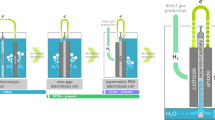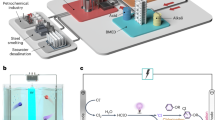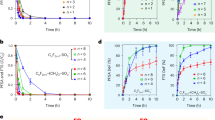Abstract
ALTHOUGH it has been pointed out that some adsorption of a solute may occur during filtrations1 there is apparently no general awareness of the possible magnitude of such losses with dilute solutions of certain solutes. Loss by adsorption of polycyclic, aromatic hydrocarbons during filtration2 or dialysis3 has been mentioned briefly, and such adsorption has been shown4 to be the cause of a major discrepancy in some recent attempts to determine the solubilities of such hydrocarbons in aqueous solutions of deoxyribonucleic acid (DNA)3,5–7. Stauff and Reske8 found filtration to be unsuitable for the removal of benzo[a]pyrene in determinations of solubility in aqueous protein solutions; they attributed the observed 20–50 per cent error to mechanical denaturation of the protein by the glass frit during filtration, but it is quite possible that adsorption of the hydrocarbon was also a contributing factor. Except for a brief investigation of the amount of protein adsorbed during the nitration of aqueous solutions through ‘Millipore’ filters9, however, there has been no detailed report on the extent of losses due to adsorption.
This is a preview of subscription content, access via your institution
Access options
Subscribe to this journal
Receive 51 print issues and online access
$199.00 per year
only $3.90 per issue
Buy this article
- Purchase on Springer Link
- Instant access to full article PDF
Prices may be subject to local taxes which are calculated during checkout
Similar content being viewed by others

References
Zimmerman, jun., H. K., Chem. Rev., 51, 25 (1952)—see p. 52.
Boyland, E., and Green, B., Brit. J. Cancer, 347 (1962).
Ts'o, P. O. P., and Lu, P., Proc. U.S. Nat. Acad. Sci., 51, 17, 272 (1964).
Boyland, E., and Green, B., J. Mol. Biol., 9, 589 (1964).
Liquori, A. M., De Lerma, B., Ascoli, F., Botré, C., and Trasciatti, M., J. Mol. Biol., 5, 521 (1962).
Boyland, E., and Green, B., Brit. J. Cancer, 16, 507 (1962).
Giovanella, B. C., McKinney, L. E., and Heidelberger, C., J. Mol. Biol., 8, 20 (1964).
Stauff, J., and Reske, G., Z. Naturforsch., 15 B, 578 (1960).
Wayne, L. G., and Kidd, G. C., Amer. J. Clin. Path., 28, 495 (1957).
Cooper, R. L., Analyst, 79, 573 (1954).
Commins, B. T., Analyst, 83, 386 (1958).
Weil-Malherbe, H., Biochem. J., 40, 351 (1946).
Munck, A., Biochim. Biophys. Acta, 24, 507 (1957).
Kofahl, R. E., and Lucas, H. J., J. Amer. Chem. Soc., 76, 3931 (1954).
Author information
Authors and Affiliations
Rights and permissions
About this article
Cite this article
INSCOE, M. Losses due to Adsorption during Filtration of Aqueous Solutions of Polycyclic Aromatic Hydrocarbons. Nature 211, 1083–1085 (1966). https://doi.org/10.1038/2111083a0
Issue Date:
DOI: https://doi.org/10.1038/2111083a0
Comments
By submitting a comment you agree to abide by our Terms and Community Guidelines. If you find something abusive or that does not comply with our terms or guidelines please flag it as inappropriate.


